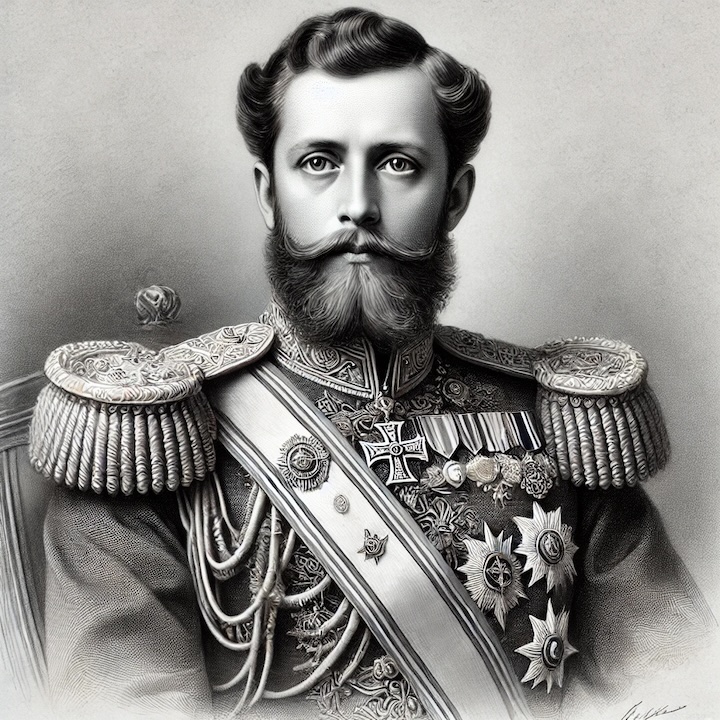Alexander II (1818-1881)

Alexander II was the son of Tsar Nicholas I. Known as a reformer, his outstanding action was to emancipate the serfs. Also effected legal and administrative reforms, expanded schools and rail lines. Was also known for the severity of repression imposed on any population unrest that arose including a Polish revolt in 1863, peasant turmoil, and revolutionary dissent. Was ultimately assassinated in St. Petersburg. (Also known as "The Liberator").
Alexander II, the son of Tsar Nicholas I, ascended to the Russian throne in 1855 during a time of significant social and political turmoil. His reign, lasting until 1881, is often remembered for a series of sweeping reforms that aimed to modernize Russia and alleviate some of the most pressing issues facing the empire. While Alexander II is most famously known as “The Liberator” for his emancipation of the serfs, his legacy is complex, marked by both his progressive reforms and the harsh repression he employed against those who challenged his authority.
The Emancipation of the Serfs
Alexander II’s most notable and far-reaching reform was the emancipation of the serfs in 1861. For centuries, Russian peasants had been bound to the land and subject to the will of landowners, living in conditions akin to slavery. The serfdom system was not only inhumane but also economically inefficient, hindering Russia’s development compared to Western Europe. Recognizing the need for change, Alexander II initiated the emancipation, which freed millions of serfs and granted them the rights to own property and marry without their landlord’s permission.
However, the emancipation was not without its flaws. While the serfs were granted personal freedom, the land they were given was often insufficient and came with heavy redemption payments, which left many peasants in a state of perpetual debt and poverty. Despite these shortcomings, the emancipation of the serfs was a monumental step forward, laying the groundwork for further social and economic reforms in Russia.
Legal and Administrative Reforms
In addition to the emancipation, Alexander II introduced a series of legal and administrative reforms aimed at modernizing Russia’s archaic institutions. He established new judicial procedures that were more transparent and equitable, including the introduction of jury trials and the establishment of independent courts. These changes were intended to curb corruption and ensure that justice was administered fairly across the empire.
Alexander II also reformed local government by creating elected local councils, known as zemstvos, which were responsible for managing regional issues such as education, infrastructure, and public health. These councils gave the Russian people a limited voice in governance and helped to improve the administration of the vast and diverse Russian Empire.
Expansion of Education and Infrastructure
Understanding that Russia’s future depended on an educated populace, Alexander II expanded the country’s educational system. He established more schools, increased access to higher education, and encouraged the spread of literacy among the general population. These efforts contributed to a gradual increase in the intellectual and cultural life of Russia, helping to foster a more informed and engaged citizenry.
Alexander II also recognized the importance of infrastructure in driving economic growth. Under his reign, the construction of railways was accelerated, connecting distant regions of the empire and facilitating trade, communication, and military movement. The expansion of the rail network played a crucial role in Russia’s industrialization efforts during the latter half of the 19th century.
Repression and Revolts
Despite his reputation as a reformer, Alexander II was also known for his severe repression of any unrest or dissent within his empire. When a Polish uprising erupted in 1863, Alexander responded with brutal force, crushing the revolt and imposing harsh measures on the Polish population, including the confiscation of land and the imposition of Russian culture and language.
Similarly, Alexander II dealt harshly with peasant uprisings and revolutionary movements within Russia. He employed the secret police to suppress dissent and used military force to maintain order, leading to widespread resentment among the Russian people. This repression ultimately contributed to a growing revolutionary fervor that would continue to simmer throughout his reign.
Assassination and Legacy
The contradictions of Alexander II’s rule—his reforms on one hand and his repressive measures on the other—created a volatile environment in Russia. Despite his attempts at modernization, the discontent of those who felt his reforms did not go far enough, combined with the anger of those who opposed any change, made him a target. On March 13, 1881, Alexander II was assassinated in St. Petersburg by members of the revolutionary group Narodnaya Volya (People’s Will). His death marked the end of an era of reform and the beginning of a period of reaction and conservatism under his son and successor, Alexander III.
 >
>